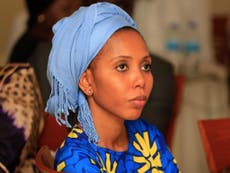Christopher Chope's objection to FGM laws is a cruel affront to survivors like me
Legislation may not be the answer, but at least it's a start

The earliest law that was put in place to tackle FGM in the UK was the Prohibition of Female Circumcision Act 1985, which was replaced by the Female Genital Mutilation Act 2003.
34 years later, on 1 February 2019, the UK had its first successful prosecution and many survivors, activists and those in government, reacted with a curious mix of joy and pain. Pain because it reminded us that we had all failed a three-year-old girl, given the prosecution of her mother will never give back her full agency or a life without pain, confusion and sadness; and joy because it seemed finally as if the severity of this issue was being taken seriously and the slow arm of justice had finally come into force.
A mere seven days later, the fate of thousands of girls lay in hands of one MP who seemed to hold all the power to change the outcome of a law with just one word: “objection”. Christopher Chope, a Conservative MP who made headlines last year for blocking upskirting legislation, is now looking to do the same for FGM laws.
Like many others, I was outraged at this turn of events that came from Friday’s House of Commons afternoon session. It was also confusing, as this was an issue that, dating back to the coalition government, many cabinet ministers have been totally behind – most recently the prime minister herself released a statement on Twitter on 6 February, International Day Against FGM, saying it is “an abhorrent practice and we will not accept it”.
Chope’s objection was yet another obstacle to protecting young girls. The after-effects of having FGM are something I have lived with throughout my life – people often forget this is not only a one-off act. Having experienced it myself at age 14, I am fully aware of what the body remembers and what it’s like to feel totally helpless and confused by a life-altering event that in a moment strips you of your human rights.
And if this legislation could be blocked, then what hope is there for that toddler, or 5-year-old, or 14-year-old girl, who would now be at even more risk of FGM? I was incensed, enraged and confused at what I quickly concluded to be a total lack of humanity by one person to “block” a law that is intended to protect vulnerable girls. My righteous barometer went into overdrive as I thought of their fate at the hands of a privileged white man who seemed to have a complete lack of human agency.
Chope said that he was trying to see if there was a way to force the government to spend more time debating the second reading of the law in the Chamber, and ensure that such issues are “properly debated”, This was tough reading for me. It now seems to be about an arcane parliamentary process and a row about how it’s best used, instead of one man allowing FGM to happen to young girls.
What has been lost in all of this, is that the more we look to legislation as the only tool in the box to end this practice and use column inches to talk about the importance of protection and prosecution, what we’re not talking about is the girl at the heart of the discussion and what is really needed, which is education.
The person we should be thinking about may be the young girl that you teach in your primary school. She may be the bubbly, fun child who comes along to Girl Guides, but then drops out and isn’t seen again and then when you see her on the street, doesn’t meet your eyes. She may be the small 3-year-old in the doctor’s surgery whom you see, but look beyond. And here’s the kicker – if her origins are Egyptian, Indonesian, Malaysian – you may not think that she is at risk. But if she comes from a Somali, Gambian, or like me, Sierra Leoneon background, you may draw a conclusion.
But FGM is a global issue. It affects 200 million girls and women around the world. Let’s make sure that this news drives us towards understanding what more we can do in our own communities, with our own girls, to educate people and end the practice and leave the braying to parliamentarians once and for all. I only hope that the better news to come from this is that they will debate the law to its fullest extent and we ultimately get a stronger outcome for girls.
Jay Kamara-Frederick is an author, activist and campaigner on FGM and violence against women



Join our commenting forum
Join thought-provoking conversations, follow other Independent readers and see their replies